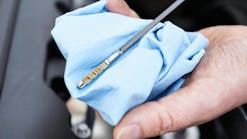The shops and restaurants at Philadelphia International Airport are sleek and crowded, a mall-in-the-skyways that churns up millions in profits.
Behind the shiny store facades, though, is a legacy of political deal-making that stretches back a decade and thrives even now.
If you buy a drink in many of the airport's bars or a magazine at its newsstands or put a dollar in its vending machines, you're putting money in the pockets of a network of people with ties to Mayor Street, Gov. Rendell or other politicians.
Their names are a roster of power brokers old and new: White, Cianfrani, Salvatore, Nix. And many got in through a program designed to help the disadvantaged.
Now, the FBI has revved up its investigation of the city-owned airport, trying to determine whether any deals there add up to fraud.
Concession records have been subpoenaed this summer, as agents interview vendors, employees and other airport workers.
Many of the deals under FBI scrutiny were pushed by the late Ronald A. White, a longtime Street fund-raiser known around the airport as "the juice man" for his reputation as a kingmaker in City Hall.
The airport investigation is part of the wide-ranging city corruption probe, which included 25,000 phone calls wiretapped from White's phones, and 3,000 from the cell phone of James Tyrell, a senior airport official.
White is gone now - he died last year - but some of his deals are still going strong.
White's widow, Aruby Odom-White, a well-to-do psychiatrist, owns shares of two contracts, one to run six bars and another to operate six newsstands, though her firms have no employees, and she has had little role in the day-to-day operations. She has not been accused of wrongdoing.
White's longtime girlfriend, Janice Knight (also known as Renee Knight), was convicted May 9 of lying twice to FBI agents and has been sentenced to 51/2 months in prison and fined $100,000. But she still collects a share of the proceeds from an airport bar and from some of its vending machines, her lawyer says.
Even the city-hired company that manages the concession operation tried to get in on the action: on an FBI recording, the company's local partner was heard appealing to White to get his own piece of an airport bar.
These and other airport deals were part of a federal program that is supposed to make sure disadvantaged business owners - minorities, women and the disabled - get a fair share of airport contracts.
But in practice, here and in airports across the country, that program has become a vehicle to steer business to well-off people with political sway.
Once in place, some of these minority investors have done little besides lend their names and money, despite federal rules requiring them to do actual work, records and interviews show.
In Knight's vending venture, for example, her "job" was to take Coke orders from her partner and pass them along to bottlers - and add a quarter a can.
Inspectors from the U.S. Department of Transportation have also been poking into the airport's concession program, hunting for violations of the agency's rules about hiring minorities.
Knight's lawyer, Nino V. Tinari, said that since Knight's conviction, federal authorities had pressed her to become their witness.
According to evidence from her trial, she received a $250,000 loan from Commerce Bank so she could obtain an equity interest in one of the airport bars. But Knight never promised to manage the bar, Tinari said. She thought it was OK to be a silent investor - and no one running the airport said otherwise.
"Was there any time the city said she had to do something?" he said. Airport officials would not grant an interview, although sources say they are rigorously reviewing the city's oversight responsibilities.
The mayor's office has maintained that, although the city could veto any vendor recommended, it had a generally hands-off practice in concession matters.
Knight's firms are no longer certified as legitimate minority businesses, meaning that the city cannot count her contracts toward meeting its minority business goals. But she is still getting paid, Tinari said.
Odom-White's lawyer, Howard Bruce Klein, says his client, too, thought the deals were legal. "From what she knew, she didn't do anything that violated the law," he said.
Whether or not criminal charges result, it is clear that the city lost control of its airport concession program, allowing political patronage deals to flourish.
One big reason: No one was able or willing to puncture the influence of White, who tried mightily to control which minorities and women could share in the concession contracts.
That includes Aviation Director Charles Isdell. On a June 2003 FBI tape, he seemed to take his cue from White, a lawyer who for years handled bond work and airport real estate matters for the city. On this day, White was annoyed because he thought an airport printing deal for Knight was being delayed by Mark Pesce, the airport's public-relations chief.
"Make sure it don't sit around on his desk," White told Isdell.
"OK," Isdell answered.
These days, nobody wants to talk about what the city should have been doing, or what, if anything, is being done now to fix things. Isdell, one of the city's best-paid officials at $153,000 a year, declined comment. "His schedule does not allow him to be available," Pesce said in response to a request to interview Isdell. He suggested contacting the airport's lawyers; they also declined comment.
The city's Minority Business Enterprise Council was also supposed to be a watchdog, making sure minority vendors did real work and met federal rules. But MBEC had its own troubles, and applications from White-backed vendors sailed through, said a lawyer for a former MBEC employee who approved many of the applications.
Robert Mozenter, whose client, Paul J. Newman, is now in prison on an unrelated fraud charge, said, "Ron White had special privileges there."
MarketPlace/Redwood, the company that 10 years ago won an ugly contest to manage the concessions, did not slow White down, either. In fact, Ricardo Dunston, head of Redwood Advisory Inc., the local partner in the management team, used White as a lawyer and in 2003 asked White's help in getting a share of one of the bars he was supposed to be overseeing.
"He's definitely got a piece for you," White told Dunston, referring to the airport's biggest bar operator.
In the end, Dunston did not get that "piece," and on other tapes, he and White were at odds. (White counseled an associate: "Don't waste your time talking to Rick Dunston. He ain't on top of it.")
Dunston, whose firm still helps manage the airport's concessions, declined to comment.
The story of how the airport's terminals became a hub for the politically connected goes back at least a decade, to the dawn of a concession plan begun by then-Mayor Rendell and then-City Council President Street.
An out-of-town firm, MarketPlace Development, was teaming up with Philadelphia's own Redwood, which has managed the Shops at Liberty Place and Penn's Landing, to transform the airport's mediocre shops and eateries.
A priority for Rendell and Street was to make sure opportunities for local African Americans and other minorities were built in. It was the law, too: Each year, airports have to tell federal regulators how they're doing in meeting affirmative-action goals.
But decisions on who got concessions quickly became a tug-of-war between executives at the Boston-based MarketPlace, who preferred national chains, and city politicians, who wanted the spots to go to locals.
In theory, MarketPlace/Redwood, not politicians, was supposed to select the vendors. It did not always work that way.
Rendell's former chief of staff, David L. Cohen, recalled the tension. "There was always a little bit of push-back from the city to make sure we had a local balance," he said. "Rick [Dunston], I think, often felt like he was in the middle of those battles."
In that turbulent environment, White's influence grew.
For instance: In late 1997, White went over a list of planned airport stores and restaurants with then-MarketPlace president William Coleman, telling him which minorities and women should get a slice of each - and which should not.
When FBI agents raided White's law office in October 2003, they found a secretary's memo of that 1997 conversation in a computer.
For one airport candy store, the memo said, White told Coleman that labor leader Sam Staten Sr. and another businessman "would have to come off the list." Then he added two new names, "prioritized in the following manner: 1) Renee Knight, 2) Jane Rose."
Knight was White's girlfriend; Rose had been a friend since his childhood days in North Philadelphia's Richard Allen Homes housing project.
Coleman, who has left MarketPlace, and current MarketPlace president Paul O. McGinn both declined to comment for this story.
Meanwhile, for politicians, the airport businesses became a wellspring of campaign money.
Dunston, with some help from the vendors whose leases he managed, raised almost $100,000 for Street's mayoral campaigns, campaign finance records show.
By 2001, White had moved from pushing deals for others to taking them for himself.
With his help - and with no objection from the city or MarketPlace/Redwood - longtime Philadelphia club owner Eric Blatstein became the airport's dominant food and beverage operator. Nine of the 16 bars and restaurants he runs pulled in a total of more than $18 million in gross receipts last year, records show.
Among those who Blatstein took in as disadvantaged partners in those bars: Odom-White and Knight; Laura Foreman, widow of former State Sen. Henry J. "Buddy" Cianfrani, the powerful South Philadelphia Democrat whose relationship with Foreman began when she was an Inquirer political reporter; and the wife and two daughters of former State Sen. Frank Salvatore (R., Phila.), who owned a beverage company and who, as a senator, shaped state liquor law.
"The name is there. I don't really do anything with it," Gloria Salvatore, the ex-senator's wife, said in a brief phone interview last week. She said her husband handled those matters.
That is no way to run an airport, says Mary Rose Loney, the airport's director when the program was turned over to MarketPlace/Redwood.
Loney, who is still a consultant for the airport, said the idea was to spread opportunities for local vendors and create variety.
She said she was "startled" to learn of Blatstein's and White's domination of the bars.
"As director of the airport, it was never my intention to concentrate local and disadvantaged business opportunities under one person or one person and their relatives, certainly not," she said. "Competition tends to deliver the best product for the passengers."
Still, word of White's influence got around. A national newsstand operator, Hudson News, had tried to get into the airport in 1995 and was stymied when Rendell chose a vendor who was a newspaper and magazine wholesaler in North Philadelphia. The second time around, Hudson News turned to White.
In written answers to Inquirer questions, Hudson said it contacted White because he was "highly regarded in both the legal and business communities" and asked his help in finding a minority partner.
White found one close to home: his wife, psychiatrist Odom-White.
City records show that her brand-new company, Hoppergrass Ltd., had no business besides the Hudson deal. Hudson said Odom-White participates in "management and oversight" of the business but declined to give details.
During one of the recent corruption trials, her daughter, lawyer Simone White, testified that Hoppergrass had no employees.
"Did your mother herself physically participate in the work of Hudson News at the airport in running the newsstands?" a prosecutor asked.
"No," Simone White replied. Likewise, as far as she knew, her mother had no bar employees and played no role in actually running them, either, she said.
Asked again on cross-examination, White gave a slightly different answer about whether her mother helped run the businesses: "Now she does."
Hudson's stores at the airport took in $5.3 million last year, but Odom-White's firm has still not been paid anything because the stores have yet to turn a profit, the company said.
White, who was facing corruption charges when he died of cancer in November at age 55, was not the only connected figure in airport contracts.
Carl Singley, a lawyer and now-estranged friend of Street's, has a stake in a PGA Tour store and two gift shops. Robert Bogle, publisher of the Philadelphia Tribune and a member of the Delaware River Port Authority board, owns 40 percent of the T.G.I. Friday's, records show.
Robert N.C. Nix 3d, son of a late state Supreme Court justice, has a piece of other newsstands. Nix's partners - until they were bought out by Hudson last year - were executives with Press Relay, the firm that Rendell chose over Hudson a decade ago.
In an interview, Nix - who retains a 30 percent interest in the Press Relay newsstands - recalled the rigorous scrutiny of then-Rendell administration officials as they sought assurance that he would be a full-fledged business participant, with his own capital and a true management role.
But it is White's legacy of influence that still echoes in the airport terminals. It is still the trail being followed by the FBI.
On Sept 9, 2003, FBI wiretaps picked up Lana Felton-Ghee, a Street confidante, telling White that all of Philadelphia believed he controlled deals at the housing authority and the airport.
"I've had people tell me at the airport, no need to try to open a business here if Ron White don't bring it," she said.
Not so, White said - at least not at the housing authority.
"Now, the airport is a different situation," he told Felton-Ghee. "I know what's going on over there, you know what I mean?"

News stories provided by third parties are not edited by "Site Publication" staff. For suggestions and comments, please click the Contact link at the bottom of this page.




